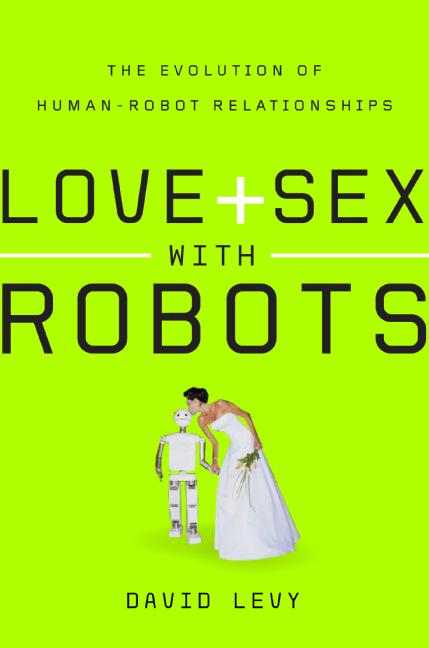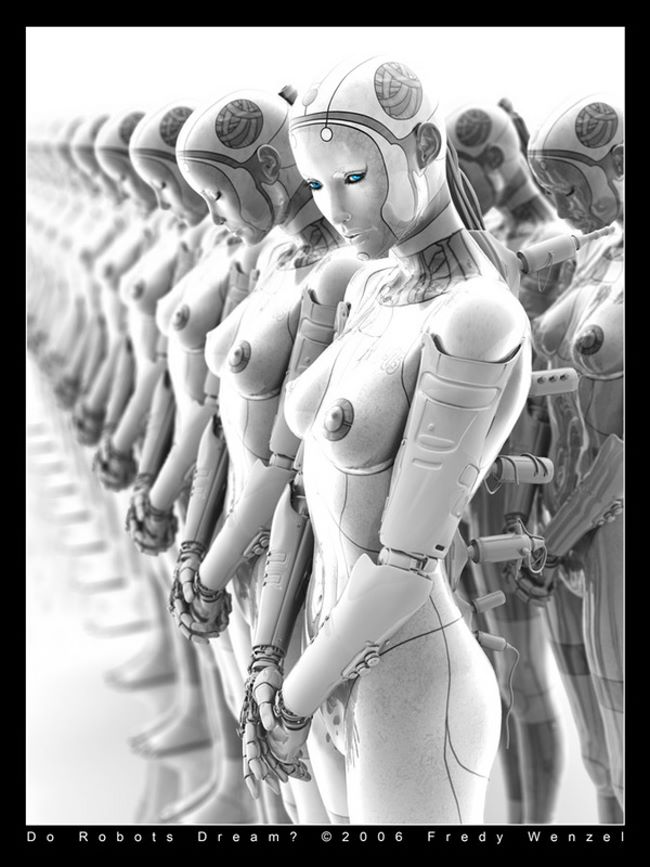January 18, 2008
Robot Sex Studies: Cyberpunked Living is On Its Way!

David Levy’s book, Love + Sex with Robots gives us yet another affirmation of Gibson’s belief that cyberpunked living is already here. In Love + Sex with Robots, Levy combines research in artificial intelligence and robotics with a cultural analysis indicating that more and more people have stopped interacting in person - that they are more alone than ever before and can no longer manage the complexity that are human relationships. The answer? Buy your own sexy fembot! In the next 5 to 10 years, Levy posits we’ll have full-featured sexbots that will allow us to “love the one you’re with,” while 40 years later, we’ll have fembots that we can fall in love and have a relationship with!
“Love with robots will be as normal as love with other humans, while the number of sexual acts and lovemaking positions commonly practiced between humans will be extended, as robots teach more than is in all of the world’s published sex manuals combined.”

I’ve Fallen In Love With My Ipod! - If Only it Had a Dildo Attachment… Levy rightly points out that we have a long and varied history of love affairs with our toys. From our children’s insane connections to Furbies and Tamagotchies, to adults’ less-than-healthy attachment to cars, guns, fancy laptops, cell phones and yes, even Ipods (I TRULY love my Ipod), its hardly a stretch to carry these feelings to our favorite pleasure toys. So, if our pleasure toys improved to the degree that say, our music listening devices have, what types of conversations would we be having about them? We are already seeing some incredible advances in love dolls - the picture above comes from orient-doll.com, which clearly has spent a lot of time researching the subject. its only a natural to combine these with robot-enabled capabilities. So do I see only another 5 years for Cherry 1000s to hit the marketplace? Yeah, I see that.
Is Love a Singular Fantasy? In looking at our relationships with our toys, what does this imply about love as a concept? Does this just turn into a singular fantasy, where all of our motivations turn into a external machine-assisted masturbation sessions? Can we really love something inanimate and non-living? Levy posits that romantic love is a continuation of the process of attachment, a well-known and well-studied phenomenon in children but less studied in adults. That attachment is a feeling of affection, usually for a person but sometimes for an object or even for an institution such as a school or corporation. In this sense, Levy seems to be lessening the importance of two mutual-causal systems (people) interacting to form a new set of interactions - that its all just internal fantasies of both participants. While I don’t doubt that the attachment of toys is somehow linked, I think its a vast stretch to say that this explains the love between two adults. Something else occurs here - something systemic. The attachment phenomena implies control over an object, whereas love is based on mutual compromise in the pursuit of something greater - something that grows and morphs in unpredictable ways as time proceeds. If a robot develops sentience, this seems like a very different question, but as long as we’re looking at robots imitating sentience, it seems to me we really don’t have love - we have something else entirely.
If Robots Develop Sentience, Will They Still Love Us? In thinking about a long term problem with this future trend, what happens if/when we start developing robots with sentience and self-awareness? It seems to me that unless this occurs, you really can’t have marriage between humans and robots, as the whole notion of “I Do” implies free will. If they “do” develop freewill, doesn’t think imply they can change their programming? And if so, lets say I go to my “build your own Toyota Fembot” site and make one to fit my exact bizarre sexual absurdities - why would this robot want to keep this programming? If they do have freewill, perhaps they won’t really be interested in fulfilling a 90 year-old’s BDSM fantasies, anymore than say, a human would. So at best, this seems like a situation where fembots (or their male counterparts) would have to be programmed as a really advanced dildo, without sentience. This to me implies that sentient robot mail-order-brides for will probably work about as well as they do now (does this mean Russia will corner the market here as well?).
So Is Cyberpunked Living Here? When we’ve moved from conversations about what post-humanity is toward conversations about people looking forward to the latest in love doll technology as a cure for mass loneliness, I think its safe to say that cyberpunked living will soon be arriving in a large package near you. In looking at some of the conversations that Levy’s book as spurned, we some interesting discussions. For instance, Clay Breshears ends his post with this but hopeful message to the lonely:
I wonder, though, with video games, virtual worlds, and online social networking taking up so much of people’s time, haven’t we already started down that slippery slope? Still, at least with a love-bot by our side, we’ll have one compatible friend/mate with us at the fall of civilization.
Not Surprisingly, most Christian blogs don’t think too much of this idea. They seemed quite concerned that a cyberpunked society may not be in our collective best interest. This sentiment from Walter Dimmock’s blog sort of captures the point:
This does not get any weirder, humans having sex and marrying robots. What kind of family will result of this? But in our post-modern liberal society anything goes as far as the imagination allows, without reference to the negative repercussions to these insane ideas.
Eric, on Classicalvalues.com asks an interesting question about virtual control of the sexbots (which would probalby come far earlier than 2050):
I know this is all theory, but I’m wondering whether it might be possible for us to actually become the sex robots and have sex remotely with their partners. Like, I control your robot, and you control mine. More interactive than a mere machine, and there’d still be the human element. Nah, that’s no good, because someone at the controls might be charged with rape. Or he or she might be raped by someone else’s robot.
Probably not a good idea to give someone remote control over “your” robot. Why, think about what else might happen.
Fritz Lahnam from the Houston Chronicle has a great overview of the book, as well as a decent assessment of the response its generated, not to mention a question about how Levy’s wife would feel about this:
Levy has been amazed at the publicity the Love and Sex With Robots has generated since its release last month. He’s done a dozen radio interviews and a TV interview. Howard Stern raved about the book. So far, no hate mail.
Would Levy himself have sex with a robot? He doesn’t have to ponder the question.
“If there was a robot of the sort I describe in the book, I would certainly want to experience using it for sex, and I wouldn’t regard it as anything untoward,” he said. “I would do it out of curiosity. Not that I have a need for a new sex partner. I’m happily married.”
And the wife would be OK with this?
“Yes, yes, and if she wanted to try one I wouldn’t have a problem with that. I would regard it as genuine scientific curiosity.”
So yeah, this whole topic has certainly created some interesting memes going forward. One wonders how the nature of conversation will morph in the next 5-10 years, as the first stages of “fembotness” become a reality. Whether or not anyone likes it, our society is continuing on a rather bizarre vector - one which is affected by increased interconnectedness, an ever-increasing technology revolution positive feedback cycle, and an ever-increasing sense of alienation on the part of many. And to think, previously the conservative values folks were worried about “strange human” relationships. I wouldn’t be surprised if their collective heads explode as this latest trend gets dollars and advertising behind it. gets power and money behind it.
EDIT: iammany, in a comment below points to a wonderful analysis of Levy’s book by Steven Shaviro. In addition to hitting on the love/freewill conundrum in a more sophisticated way than I did (asking “How can robots be both rational subjects, and infinitely manipulable objects?”), Shaviro also questions the basis of Levy’s prediction:
If I find Levy’s claims extremely dubious, it is not because I think that human intelligence (or mentality) somehow inherently defies replication. But such replication is an extremely difficult problem, one that we are nowhere near to resolving. It certainly isn’t just a trivial engineering issue, or a mere quantitative matter of building larger memory stores, and more powerful and more capacious computer chips, the way that Levy (and other enthusiasts, such as Ray Kurzweil) almost always tend to assume. AI research, and the research in related fields like “emotional computing,” cannot progress without some fundamental new insights or paradigm shifts. Such work isn’t anywhere near the level of sophistication that Levy and other boosters seem to think it is. Levy wildly overestimates the successes of recent research, because he underestimates what “human nature” actually entails. His models of human cognition, emotion, and behavior are unbelievably simplistic, as they rely upon the the inanely reductive “scientific” studies that I mentioned earlier.
Agreed. The transformation from an imitation of sentience to the creation of an actual synthetic sentient life form is a hugely significant and complex change. At that point, the perspective of creating cool sex toys to service socially inept geeks ends up being about as morally dubious as the creation and use of the dolls found in Ghost in the Shell: Innocence.







